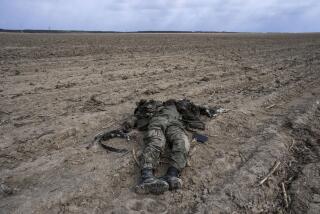Chernobyl Toll 13; Thousands to Be Monitored
- Share via
MOSCOW — The death toll in the Chernobyl nuclear plant disaster has risen to 13, Dr. Robert P. Gale, the UCLA bone marrow specialist who has helped treat disaster victims, said Friday.
He said that of the 35 patients with the worst exposure to radioactivity, only 24 were still alive three weeks after the accident. Two men were killed instantly in the explosion and fire at the reactor on April 26.
Interviewed by American television networks Friday before he left for the United States, Gale said that 100,000 or more people will be examined periodically throughout their lives in order to monitor the long-term effects of radiation from the Chernobyl reactor.
Learned From A-Bombs
Gale, who has warned that additional deaths from radiation are unavoidable, said Friday: “We know from the atomic bomb explosions that there is an increased risk of cancer and other complications that extends for many years. It may extend for 30 or more years.”
For this reason, he said, Soviet officials agreed to monitor “a fairly large number of patients, perhaps upwards of 100,000 individuals, probably forever, for the rest of their lifetimes.”
Meanwhile, the Communist youth newspaper Komsomolskaya Pravda and the news agency Tass offered dramatic personal accounts involving some of the disaster victims and heroes.
One was identified as a 23-year-old firefighter, Viktor Kibenok, who died of burns and radiation 15 days after the accident. He and other firefighters spent much of the time on the roof of the building housing the nuclear reactor, the newspaper said.
‘Volodya Feels Bad’
One by one, Kibenok’s colleagues collapsed from radiation sickness, according to the newspaper’s account. First, Vladimir Tishchura began writhing. “Viktor, Volodya feels bad,” yelled another firefighter, Vasily Ignatenko, referring to Tishchura. The newspaper said, “After that, Nikolai Vashchuk swayed and fell flat on his back.”
Kibenok “held up, being on the most dangerous place--above the reactor,” the newspaper said. “But what Viktor didn’t know then was that further below, there were a few more people who already couldn’t stand (up).”
The account said that four firefighters later died of injuries.
The news agency said that 10 days after the accident, three plant workers volunteered to dive into a pool of radiation-contaminated water under the damaged reactor to drain the water.
If the white-hot core of the reactor had dropped into the water, Tass said, it could have set off steam explosions that would have spread radioactive contamination even farther.
3 Dove into Pool
The three men in wet suits dove into a pool, probing with underwater searchlights for two small valves that would allow the pool to drain, Tass said.
It quoted one of the men, Alexei Ananenko, as telling Soviet journalists: “When the searchlight beam fell on a pipe, we were joyous: The pipe led to the valves. We heard the rush of water out of the tank. And in a few more minutes we were being embraced by the guys.”
The report did not mention if any of the men had suffered ill effects since their dive.
Meanwhile, Soviet authorities invited the heads of diplomatic missions to visit the Chernobyl area next week.
Richard E. Combs Jr., the U.S. charge d’affaires, said an invitation was received by telephone and that he was awaiting details in writing before deciding whether to make the trip.
Tourist Service Continued
Intourist, the Soviet foreign travel agency, announced that it was continuing services in Kiev, 60 miles south of Chernobyl, as it has since the accident occurred.
“Staying in the Ukrainian capital (Kiev) today are more than 1,300 foreign tourists,” Vladimir Fedorchenko, director general of Intourist’s Kiev branch, said in an interview with Tass.
The State Department has advised travelers to avoid Kiev because of possible radiation hazards.
In another report from Kiev, Tass said that the sale of milk, cottage cheese and sour cream has been suspended at private markets in the city. Farmers, Tass said, have been forbidden to sell leafy vegetables, though these are being sold at state stores.
A spokesman for the Foreign Ministry indicated that the Kremlin will refuse to pay compensation to West European governments for losses to farmers attributed to fallout from Chernobyl.
Measures taken by Western nations to restrict the sale of products and keep cattle indoors were not necessary because there was no threat to health, the spokesman said. He said the restrictions were imposed because of an “artificially created furor.”
More to Read
Sign up for Essential California
The most important California stories and recommendations in your inbox every morning.
You may occasionally receive promotional content from the Los Angeles Times.













